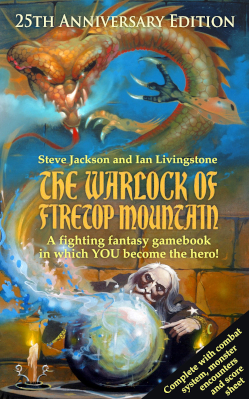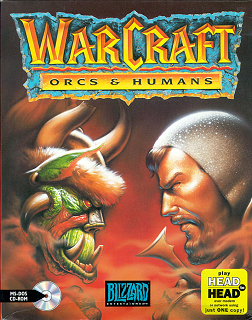Related Research Articles

A live action role-playing game (LARP) is a form of role-playing game where the participants physically portray their characters. The players pursue goals within a fictional setting represented by real-world environments while interacting with each other in character. The outcome of player actions may be mediated by game rules or determined by consensus among players. Event arrangers called gamemasters decide the setting and rules to be used and facilitate play.

A role-playing game is a game in which players assume the roles of characters in a fictional setting. Players take responsibility for acting out these roles within a narrative, either through literal acting or through a process of structured decision-making regarding character development. Actions taken within many games succeed or fail according to a formal system of rules and guidelines.

Fighting Fantasy is a series of single-player role-playing gamebooks created by Steve Jackson and Ian Livingstone. The first volume in the series was published in paperback by Puffin in 1982.

Warcraft: Orcs & Humans is a real-time strategy game (RTS) developed and published by Blizzard Entertainment, and published by Interplay Productions in Europe. It was released for MS-DOS in North America on 15 November 1994, and for Mac OS in early 1996. The MS-DOS version was re-released by Sold-Out Software in 2002.

Legend of the Five Rings is a fictional setting created by John Zinser, Dave Seay, Ryan Dancey, Dave Williams, DJ Trindle, Matt Wilson and John Wick and first published by a joint venture between Alderac Entertainment Group and ISOMEDIA in 1995. The setting primarily involves the fictional empire of Rokugan, though some additional areas and cultures have been discussed. Rokugan is based roughly on feudal Japan with influences from other East Asian cultures such as China, Mongolia and Korea. This setting is the basis for the Legend of the Five Rings Collectible Card Game as well as the Legend of the Five Rings Roleplaying Game. Legend of the Five Rings was also the "featured campaign setting" of the Oriental Adventures expansion to the third edition of Dungeons & Dragons, though this book is now out of print.
Warcraft is a franchise of video games, novels, and other media created by Blizzard Entertainment. The series is made up of six core games: Warcraft: Orcs & Humans, Warcraft II: Tides of Darkness, Warcraft III: Reign of Chaos, World of Warcraft, Hearthstone, and Warcraft Rumble. The first three of these core games are in the real-time strategy genre, where opposing players command virtual armies in battle against each other or a computer-controlled enemy. The fourth and best-selling title of the franchise is a massively multiplayer online role-playing game (MMORPG), where players control their character and interact with each other in a virtual world.

Dream Park is a 1981 sci-fi/murder mystery novel by American writers Larry Niven and Steven Barnes, set in a futuristic amusement park of the same name. It was nominated for the 1982 Locus Award and later expanded into a series of cyberpunk murder mysteries: The Barsoom Project (1989), The California Voodoo Game (1992), and The Moon Maze Game (2011). The books describe a futuristic form of live action role-playing games (LARPs), although the term was not in use when the original novel was published. The novels inspired many LARP groups, notably the International Fantasy Games Society which is named after a fictional entity in the book.

Dagorhir Battle Games is a national live action role-playing game with full-contact melee fighting and ranged combat as its primary focus. Fighters typically use foam weapons such as swords, flails, spears, bows and arrows, javelins, axes, and other medieval weapons. Participants wear period costume and are expected to stay in-character during events, although the amount of seriousness the role-playing aspect receives varies greatly by unit and chapter.

Lorien Trust is the trading name of Merlinroute ltd., a Live Action Role-Play organisation that runs LARP events at Locko Park, Derby, UK. It runs some of Britain's largest Live Roleplay events, historically claiming to attract around 1,200 to 1,500 to its first three events each year and around 2,500 to 3,000 people to The Gathering. More recent figures are lower, but not in the public domain. It was formed in 1992, originally as a charitable organisation. In 1995 it became Merlinroute ltd trading as Lorien Trust. The Lorien Trust has a well established game world, and uses its own set of LARP rules, known simply as the "Lorien Trust rules system". In addition to the four events held per year, the Lorien Trust also sanctions many smaller events to use the same system and game world.

Role-playing game theory is the study of role-playing games (RPGs) as a social or artistic phenomenon, also known as ludology. RPG theories seek to understand what role-playing games are, how they function, and how the gaming process can be refined in order to improve the play experience and produce better game products.

Live action role-playing games, known as LARPs, are a form of role-playing game in which live players/actors assume roles as specific characters and play out a scenario in-character. Technically, many childhood games may be thought of as simple LARPs, as they often involve the assumption of character roles. However, the scope of this article concerns itself mainly with LARPing in a technical sense: the organized live-action role-playing games whose origins are closely related to the invention of tabletop role-playing games in America in the 1970s.
The role-playing game Dungeons & Dragons (D&D), which receives significant attention in the media and in popular culture, has been the subject of numerous controversies. The game sometimes received unfavorable coverage, especially during its early years in the early 1980s. Because the term D&D may be mistakenly used to refer to all types of role-playing games, some controversies regarding D&D mistakenly pertain to role-playing games in general, or to the literary genre of fantasy. Some controversies concern the game and its alleged impact on those who play it, while others concern business issues at the game's original publisher, TSR. The game is now owned by Wizards of the Coast.

Myrskyn aika is a Finnish role-playing game.

Treasure Trap was a live action role-playing game established at Peckforton Castle in Cheshire in April 1982. Various splinter groups broke from the original system, some retaining the Treasure Trap name, and helped to shape the later British LARP scene.
NERO International is a live action role-playing game (LARP) played in the United States. The NERO name originally was an acronym for "New England Role playing Organization", but the game has expanded well beyond its original New England roots and thus simply adopted the acronym as part of the official name.

Curious Pastimes is an organisation that runs one of the best-known live action role-playing campaigns in the UK. CuPa is a private, profit-making company headquartered in Moreton in the Wirral in Northern England. The company was formed in 1995, as a break away group from the Lorien Trust.
Fools and Heroes is a non-profit fantasy live-action role-playing game (LARP) which was started in the autumn of 1985 by John Naylor, who placed a small advertisement looking for players in TableTop Games, Daybrook Nottingham. The first events were run in 1986 and the rules system was written and published by John Naylor and Steve Bell in 1986, by which point the national branch structure had already been established. The Society is democratic in nature and has multiple branches around the country. Most branches contain 15–20 members who play at least once a month, though some have as many as thirty. Members can travel between branches allowing them to play in various areas and interact in different plotlines. There are also yearly gatherings which involve multiple branches simultaneously, the largest of which is the Summerfest.

A tabletop role-playing game, also known as a pen-and-paper role-playing game, is a classification for a role-playing game (RPG) in which the participants describe their characters' actions through speech and sometimes movements. Participants determine the actions of their characters based on their characterization, and the actions succeed or fail according to a set formal system of rules and guidelines, usually involving randomization. Within the rules, players have the freedom to improvise, and their choices shape the direction and outcome of the game.

Emily Care Boss is an indie roleplaying game designer, theorist and publisher. She was a foundational member of The Forge, an early leader in the indie role-playing game movement and is considered the creator of the American Freeform genre of roleplaying games, which combine indie RPG principles and mechanics with Nordic freeform and American chamber live action role-playing techniques. She has been referred to as the "Dean" of the North American school of structured freeform game design.
References
- ↑ "The rise of live action role-playing". BBC News. 31 August 2013. Retrieved 20 November 2017.
- 1 2 Clarkson, Adam (16 October 2023). "Larp: Meet the people fighting orcs and casting spells". BBC News.
- ↑ "Dressing Up and Fighting Orcs". What's Your Thing?. Series 1. Episode 5. 9 December 2023. BBC.
- ↑ "Empire – A fully detailed world, shared with players" (PDF). International LARPzeit. 2013. Retrieved 20 November 2017.
- ↑ Montola, Markus; Stenros, Jaakko (2008). Playground Worlds (PDF). Ropecon ry.
- ↑ Welch, Isabella (10 October 2019). "Grown Ups Play Dress Up – The World of Live Action Roleplaying Costuming". Cherwell.
- ↑ Liz Sharpe (13 April 2015). "Great Alne is the backdrop of a medieval fantasy battle". Redditch & Alcester Advertiser. Retrieved 20 November 2017.
- ↑ Vicky Lane (15 August 2015). "The secret life of orcs". easyJet Traveller. Retrieved 20 November 2017.
- ↑ Kate Townshend (29 May 2015). "Role play, chivalry and a world without sexism: Welcome to the ultimate female fantasy". The Telegraph. Retrieved 20 November 2017.
- ↑ Ed Fortune (12 July 2012). "Interview: Profound Decisions' Matt Pennington". Starbust Magazine. Retrieved 20 November 2017.